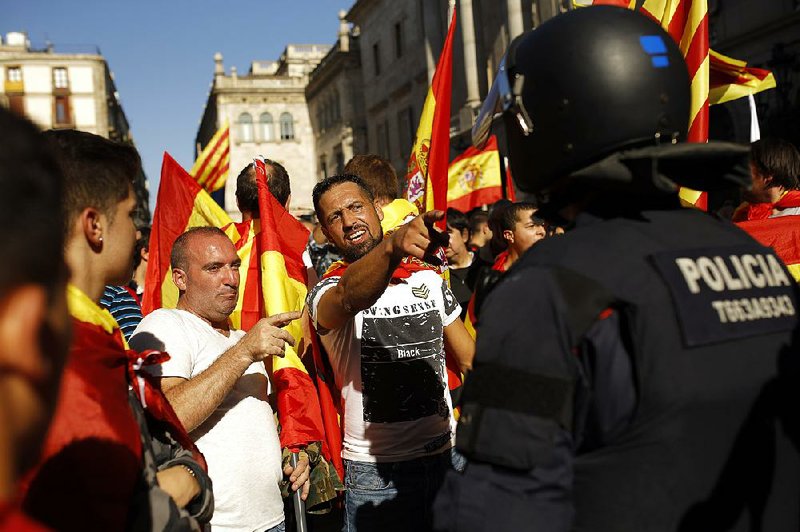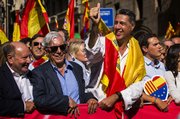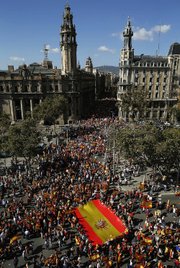BARCELONA, Spain -- Hundreds of thousands of people rallied Sunday in downtown Barcelona to protest against the plans of Catalonia's regional government to secede from the rest of Spain. The march was the largest pro-union showing since the rise of separatist sentiment in the prosperous northeastern region that has pushed Spain to the brink of a national crisis.
They chanted "Don't be fooled, Catalonia is Spain" and called for regional President Carles Puigdemont to go to prison for holding an illegal referendum last week. Some of the demonstrators took to rooftops, including families with children, and leaned over ledges from their perches overlooking the streets below to wave giant Spanish flags in a city accustomed to the prevalence of the Catalan pro-independence "estelada."
Barcelona police said 350,000 people participated, while march organizers Societat Civil Catalana said that 930,000 people turned out. The march was peaceful and no major incidents were reported.
Puigdemont pledged to push ahead for independence in comments broadcast Sunday.
"What's happening in Catalonia is real, whether they like it or not," said Puigdemont, whose comments to Catalan broadcaster TV3 were taped Wednesday. "Millions of people have voted."
He is set to address the regional parliament on Tuesday "to report on the current political situation." In the days after the Oct. 1 referendum, the momentum appeared to be on his side. Pro-independence protests were attracting large numbers and he benefited politically from a violent crackdown by Spanish police during the referendum voting.
But now the tide seems to be turning. Catalonia's top two banks announced they were relocating their headquarters to other parts of Spain because of financial uncertainty if there is an independence declaration. Other companies are reportedly considering leaving Catalonia to avoid being cast out of the EU and its common market in the case of secession.
A delegation from Cercle d'Economia, a business forum, met with Puigdemont on Saturday to demand he withdraw his threat to declare a Catalan republic, said Jordi Alberich, the group's director general.
"We asked him to directly remove the shadow of a declaration by saying that it won't happen," Alberich, who was at the meeting, said by phone Sunday. "The situation is the most tremendous mess. Despite everything I believe that some solution will be found through sensible political negotiation."
And Sunday's mass demonstration by pro-unity Catalans, under the slogan of "Let's recover our common sense!" will put further pressure on Puigdemont.
The rally comes a week after the Catalan government held a referendum on secession that Spain's top court had suspended and the Spanish government said was illegal.
Catalan authorities say the "Yes" side won the referendum with 90 percent of the vote, though only 43 percent of the region's 5.3 million eligible voters turned out in polling that was marred by police raids of polling stations on orders to confiscate ballot boxes.
Spanish Prime Minister Mariano Rajoy vows that his government will not allow Catalonia, which represents a fifth of Spain's economy, to break away from the rest of the country.
In an interview with the Spanish newspaper El Pais published Sunday, Rajoy said that he will consider employing any measure "allowed by the law" to stop the region's separatists.
Rajoy said that includes the application of Article 155 of the Spanish Constitution, which would allow the central government to take control of the governance of a region "if the regional government does not comply with the obligations of the Constitution."
"The ideal situation would be that I don't have to find drastic solutions, but for that to happen there will have to be some rectifications [by Catalan leaders]," Rajoy said.
Before Sunday's march, hundreds gathered outside the local headquarters of the Guardia Civil, Spain's military police, expressing support for its actions during the independence referendum.
Protesters, some of whom arrived via bus or train from other parts of Spain, were backed by the ruling People's Party, the pro-government Ciudadanos party, and, at the last minute, by the opposition Socialist Party.
Rallies were held Saturday in Madrid, Barcelona and other cities to demand that Rajoy and Puigdemont negotiate to find a solution to Spain's worst political crisis in nearly four decades.
"I hope that nothing will happen. Because [Catalonia] is going to lose more than [Spain] because businesses are fleeing from here already," said protester Juliana Prats, a Barcelona resident. "I hope it will remain like it has been up until now, 40 years of peace."
The rally drew Spaniards from outside the northeastern region to the Catalan capital. One group held a large banner boasting "Marbella," a town on Spain's southern coast. An AP reporter spoke with another man who had come from the northern Basque Country region.
Nobel Literature Prize laureate Mario Vargas Llosa and former president of the European Parliament Josep Borrell addressed the rally.
"Besides Catalans, there are thousands of men and women from all corners of Spain who have come to tell their Catalan companions that they are not alone," said Llosa, who took on Spanish citizenship in addition to that of his native Peru in 1993. "We want Barcelona to once again be the capital of Spanish culture."
Borrell added that: "Catalonia is not a state like Kosovo where rights were systematically violated."
A Spanish freelancer, who has lived in Barcelona for the past seven years, wondered aloud if she and her Scottish boyfriend belong in Catalonia anymore. "We're open individuals, citizens of the world," said Maribel Villalba. "We just want to live peacefully. You can't put half the population against the other half."
The well-known Catalan film director Isabel Coixet, based in Barcelona, has been telling people for months that the referendum and the independence movement were getting this wrong.
"Half of the Catalans don't want this," she said in an interview.
"The international press has bought the Catalan politician's narrative that's been sold with a huge PR campaign and lots of money. And it seems that the rest of us don't even exist. We are at least half of the Catalans, and we have no voice. No one is listening to us," Coixet said.
Rajoy's government has repeatedly refused to grant Catalonia permission to hold a referendum on grounds that it is unconstitutional since it would only poll a portion of Spain's 46 million residents.
Catalonia's separatists camp has grown in recent years, strengthened by Spain's recent economic crisis and by Madrid's rejection of attempts to increase self-rule in the region.
Information for this article was contributed by Joseph Wilson and Frank Griffiths of The Associated Press; Charles Penty, Maria Tadeo, Alan Crawford and Angeline Benoit of Bloomberg News; William Booth, Pamela Rolfe and Raul Gallego Abellan of The Washington Post; and Alvise Armellini of Tribune News Service.
A Section on 10/09/2017



